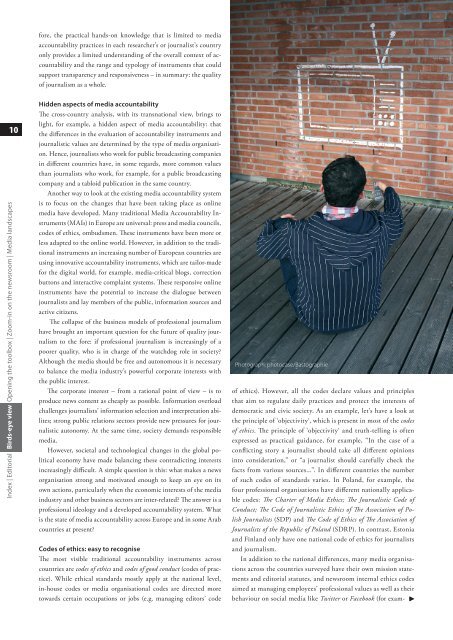MediaAcT
How fragile is media credibility? Accountability and transparency in journalism: research, debates, perspectives Final Research Report | Media Accountability and Transparency in Europe
How fragile is media credibility? Accountability and transparency in journalism: research, debates, perspectives
Final Research Report | Media Accountability and Transparency in Europe
You also want an ePaper? Increase the reach of your titles
YUMPU automatically turns print PDFs into web optimized ePapers that Google loves.
Index | Editorial | Birds-eye view view|<br />
Opening the toolbox | Zoom-in on the newsroom | Media landscapes<br />
10<br />
fore, the practical hands-on knowledge that is limited to media<br />
accountability practices in each researcher’s or journalist’s country<br />
only provides a limited understanding of the overall context of accountability<br />
and the range and typology of instruments that could<br />
support transparency and responsiveness – in summary: the quality<br />
of journalism as a whole.<br />
Hidden aspects of media accountability<br />
The cross-country analysis, with its transnational view, brings to<br />
light, for example, a hidden aspect of media accountability: that<br />
the differences in the evaluation of accountability instruments and<br />
journalistic values are determined by the type of media organisation.<br />
Hence, journalists who work for public broadcasting companies<br />
in different countries have, in some regards, more common values<br />
than journalists who work, for example, for a public broadcasting<br />
company and a tabloid publication in the same country.<br />
Another way to look at the existing media accountability system<br />
is to focus on the changes that have been taking place as online<br />
media have developed. Many traditional Media Accountability Instruments<br />
(MAIs) in Europe are universal: press and media councils,<br />
codes of ethics, ombudsmen. These instruments have been more or<br />
less adapted to the online world. However, in addition to the traditional<br />
instruments an increasing number of European countries are<br />
using innovative accountability instruments, which are tailor-made<br />
for the digital world, for example, media-critical blogs, correction<br />
buttons and interactive complaint systems. These responsive online<br />
instruments have the potential to increase the dialogue between<br />
journalists and lay members of the public, information sources and<br />
active citizens.<br />
The collapse of the business models of professional journalism<br />
have brought an important question for the future of quality journalism<br />
to the fore: if professional journalism is increasingly of a<br />
poorer quality, who is in charge of the watchdog role in society?<br />
Although the media should be free and autonomous it is necessary<br />
to balance the media industry’s powerful corporate interests with<br />
the public interest.<br />
The corporate interest – from a rational point of view – is to<br />
produce news content as cheaply as possible. Information overload<br />
challenges journalists’ information selection and interpretation abilites;<br />
strong public relations sectors provide new pressures for journalistic<br />
autonomy. At the same time, society demands responsible<br />
media.<br />
However, societal and technological changes in the global political<br />
economy have made balancing these contradicting interests<br />
increasingly difficult. A simple question is this: what makes a news<br />
organisation strong and motivated enough to keep an eye on its<br />
own actions, particularly when the economic interests of the media<br />
industry and other business sectors are inter-related? The answer is a<br />
professional ideology and a developed accountability system. What<br />
is the state of media accountability across Europe and in some Arab<br />
countries at present?<br />
Codes of ethics: easy to recognise<br />
The most visible traditional accountability instruments across<br />
countries are codes of ethics and codes of good conduct (codes of practice).<br />
While ethical standards mostly apply at the national level,<br />
in-house codes or media organisational codes are directed more<br />
towards certain occupations or jobs (e.g. managing editors’ code<br />
Photograph: photocase/Bastographie<br />
of ethics). However, all the codes declare values and principles<br />
that aim to regulate daily practices and protect the interests of<br />
democratic and civic society. As an example, let’s have a look at<br />
the principle of ‘objectivity‘, which is present in most of the codes<br />
of ethics. The principle of ‘objectivity‘ and truth-telling is often<br />
expressed as practical guidance, for example, “In the case of a<br />
conflicting story a journalist should take all different opinions<br />
into consideration,” or “a journalist should carefully check the<br />
facts from various sources...”. In different countries the number<br />
of such codes of standards varies. In Poland, for example, the<br />
four professional organisations have different nationally applicable<br />
codes: The Charter of Media Ethics; The Journalistic Code of<br />
Conduct; The Code of Journalistic Ethics of The Association of Polish<br />
Journalists (SDP) and The Code of Ethics of The Association of<br />
Journalists of the Republic of Poland (SDRP). In contrast, Estonia<br />
and Finland only have one national code of ethics for journalists<br />
and journalism.<br />
In addition to the national differences, many media organisations<br />
across the countries surveyed have their own mission statements<br />
and editorial statutes, and newsroom internal ethics codes<br />
aimed at managing employees’ professional values as well as their<br />
behaviour on social media like Twitter or Facebook (for exam-


